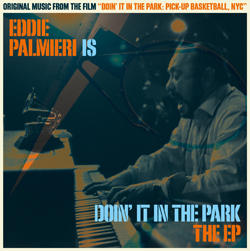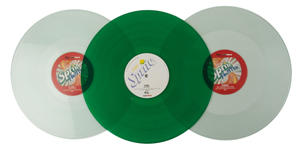Are You Dropping the Needle
or Clicking the Mouse?
Not long ago, as I was strolling through my in-laws’ garage, I was frozen in my tracks by a mountain of old, dusty albums stacked high upon a desk. I immediately went over to get a closer look at the piles of LPs, and before long I was lost in time – enamored with the relics of a bygone era. One by one, I flipped through dozens of albums recorded by artists such as Aretha Franklin, Isaac Hayes, Nancy Wilson, Horace Silver and Sergio Mendes.
This trove of records was the result of some “fall cleaning” my mother-in-law was doing. The records I dug through were some 40 or 50 years old, which got me thinking that 40 years from now, when I go to clean out my garage, there won’t be any physical music media left.
That’s because 99.9% of the new music I listen to is on a digital device. Around the world, 15,000 tracks are downloaded from iTunes every 60 seconds1, and I take full advantage of this portable music era by downloading and streaming music. Virtually any song I care to hear at any given time is immediately available to me on a mobile device. Incredibly convenient, yes, but it will leave little to nothing in the way of keepsakes.
I fast-forward my thoughts to 2053 and picture myself cleaning out my garage. The backup hard drive of music that I will find (in my imagination) has nothing on the experience of digging through crates of dusty, vinyl records. Vinyl is better for several reasons.
To explore this phenomenon further, I spoke with legendary DJ Bobbito Garcia, one of the most unabashedly pro-vinyl voices you’ll find anywhere, to get his insights. Since the launch of Bobbito’s East Village Radio Show on May 20, 2013, Garcia has played strictly vinyl records in his two-hour sets. Such a believer in vinyl is he that on occasion, he has sent songs only available in a digital format to a pressing plant in the United Kingdom to make a one-time vinyl pressing so he could play them.
Although I love both LPs and mp3s, here are five reasons why “Dusty” (analog vinyl records) tops “Digital” (downloads):
1. The Sound
For Garcia, it’s a matter of quality over convenience. “Analog sound is unequivocally, undebatably, superior to digital sound,” he argued via phone. “Analog reaches a wider spectrum and has a warmer sound than digital waves.The music I play fits that.” He’s referring to the range of Latin, soul, jazz, Afro-beat and rare funk he spins on his weekly show. “If I was playing ‘top 40’ music,” he adds, “it wouldn’t really matter.”
Although digital recordings can capture thousands of samples per second, it takes a lot of computer storage to get the same sound quality as many vinyl recordings. The choice often boils down to preserving great sound resolution or saving hard drive space. To conserve storage on our devices, we often sacrifice digital recording quality, losing bits of information in the process. While there are certainly some really good digital recordings and some really bad analog recordings, the superior, loss-less sound quality of vinyl is typically the winner.
2. Collecting
There is a pure nostalgia factor associated with holding a physical album in your hand. It doesn’t take long to emote over the medium. Simply viewing an album’s decorative cover art can invoke memories, which could even be unrelated to the music contained therein.
There are hundreds of albums in theCoca-Cola Archives record collection, including recordings form artists such as Ray Charles, Aretha Franklin, The Supremes, Little Milton and The 5thDimension, all of whom sang theCoca-Cola jingle in the 1960s and 1970s. There are also some creative pieces such as Sprite Green-colored vinyl records released in partnership with labels such as Def Jam in the early 2000s, including songs by EPMD, LL Cool J and Heavy D.
Anyone with access to a computer can find and download an mp3 of a rare song, but holding that (sometimes) elusive vinyl album in your hands takes the experience to a whole different level. What is there of digital-only music that one can collect (other than hard drives)? The physical medium wins this one, hands down.
3. Liner Notes
You may recall liner notes – text write-ups often in the form of pensive essays printed on the jacket housing the album. Frequently written by someone other than the artist, liner notes were deliberately penned to provide the listener with more context about the artist, or the story of the album.
“Liner notes meant the world to me,” Garcia said. “Certain records don’t need liner notes, but when it comes to music that has some emotion, some value, the liner notes are vital.” Garcia, who has written liner notes for several albums over the years, recently wrote the notes for the soundtrack to a movie he co-directed, titled Doin’ it in the Park: Pick-Up Basketball, NYC which explores the history and culture of New York City’s playground basketball scene.
Eddie Palmieri, a nine-time Grammy Award-winning musician, recorded original compositions for the film’s score. Palmieri, whose career spans more than 50 years as a bandleader of Salsa and Latin Jazz orchestras, contributed five tracks to the soundtrack EP, which was released on CD, digital and, of course, vinyl. It’s the first Palmieri album released on vinyl in 25 years.

“Do you know how proud I was to write liner notes for a soundtrack that I was a music supervisor on with a living legend that my father used to listen to back in the 1960s and my mother used to dance to?” Bobbito asked. “People need to know the relationship I have to Eddie Palmieri and what that relationship means to me emotionally.”
Music fans today are hard-pressed to uncover liner note-worthy back stories via artists’ YouTube channels and social media posts. I appreciate much more the intentional presentation of the liner notes stories so often shared directly with fans. Buzz about digital liner notes continues to gain traction, but it’s only nascent. Liner notes on album jackets are tried and true. This category easily goes to vinyl.
4. Preservation
Would the imagined hard drive in my garage in 2053 even be playable? It’s tough enough nowadays to find a computer that can read floppy disks from a decade ago. Even if you do find a machine with a floppy disk drive, they often do not have the software needed to open the files. Take that issue and apply it to digital music preservation.
I know that I can preserve a vinyl record for decades if stored at the correct constant temperatures. In fact, vinyl is one of the most stable physical audio formats. Digital files can be a headache for us Archivists in the business of ensuring the long-term preservation of historic records. Digital audio formats depend on particular hardware, operating systems and software to playback music. Who knows if the digital formats we use now will work in the future? Vinyl is stable and still stands up as the proven superior to digital against the test of time. Vinyl wins again.
5. Stories
In the film documentary, Searching for Sugar Man, a Detroit-based musician named Sixto Rodriguez – who achieved cult-like success in South Africa but was totally unaware of it – was eventually tracked down and celebrated in part based on clues found in the credits and lyrics on his album’s sleeve. Although the artist was thought to be dead, his fans put pieces of information found on his vinyl album’s jacket together, launching the worldwide hunt to find him.
I can also tell firsthand of the stories and adventures one vinyl record can spur. An obscure album by pianist Albie Louw found in the Coke Archives led me as well on a worldwide search that culminated in South Africa.
The likelihood of a “Sugar Man” story being birthed 30 years from now from digital files alone is very unlikely. Vinyl gets the edge.
The Positives of the Digital Age
It’s not lost on me that the Albie Louw story never would have been possible without the power of the Internet, which allowed me to share the album and eventually connect all the dots and the people involved in the story. There are clearly some benefits – and ironies – to accessing music digitally as well.
Prior to the internet boom, many fans of the radio show Bobbito Garcia co-hosted along with DJ Stretch Armstrong in the 1990s would record the programs on audio cassette tapes and share analog dubs with friends until they made the rounds – sometimes weeks later.
Ironically, Garcia’s new, vinyl-only radio show streams live on an Internet-only radio platform. “I’m not opposed to digital,” he says. “My radio show exists in a digital space.” That’s right – if you’re not within an earshot of the East Village Radio storefront studio the show is broadcast from, you can only hear it online.
As Garcia spins his analog grooves from the heart of New York City’s famed East Village neighborhood, it streams live digitally to an international audience. No longer is there a question of whether it was captured on analog tape, as all of the shows are archived and available online. “That’s amazing,” he added, thankful that listeners can hear his show immediately anywhere in the world where there is an Internet connection.
Although he’s a staunch advocate for vinyl, Garcia makes it clear that he’s no luddite. “I don’t mind that people play digital. There are advances to be made,” he says, referencing technology and the increased accessibility of digital music. “It provides a choice, and I like the ability to choose. If enough DJs make a choice to say ‘I’m not going to play a record unless it is put out on vinyl,’ that would force the hand of record labels to put out vinyl on a continual basis for the benefit of peoples’ ears and for the benefit of choice.”
“However, accessibility is a two-sided coin,” he cautions. “If I choose to buy vinyl, it doesn’t affect others’ ability to buy digitally, but their choice to buy digitally affects my ability to buy vinyl. I can’t buy certain records on vinyl because they don’t exist – a lot of DJ’s nowadays choose to buy digital.”
Even though there has been a 12.8% decrease in physical music sales, vinyl music sales have seen their fifth consecutive year of growth. 2 Garcia is quick to point out that the increase in vinyl sales represents indie rock and punk genres – not the styles he plays on his show.
Join the Debate
So, what do you prefer… dusty (vinyl) or digital (downloads)? Cast your vote here! For me, the experience of dropping the needle beats clicking the mouse. I cast my vote for “Dusty.”
Reposted with permission from Coca-Cola.

